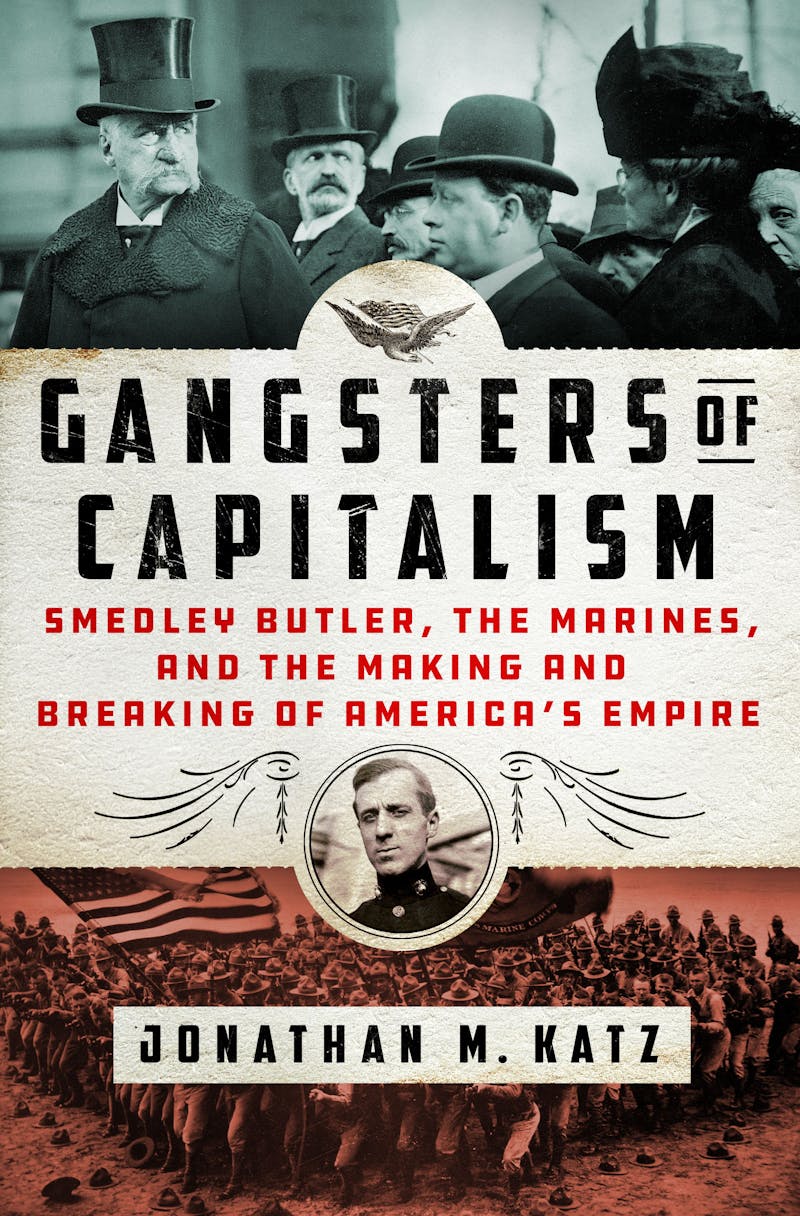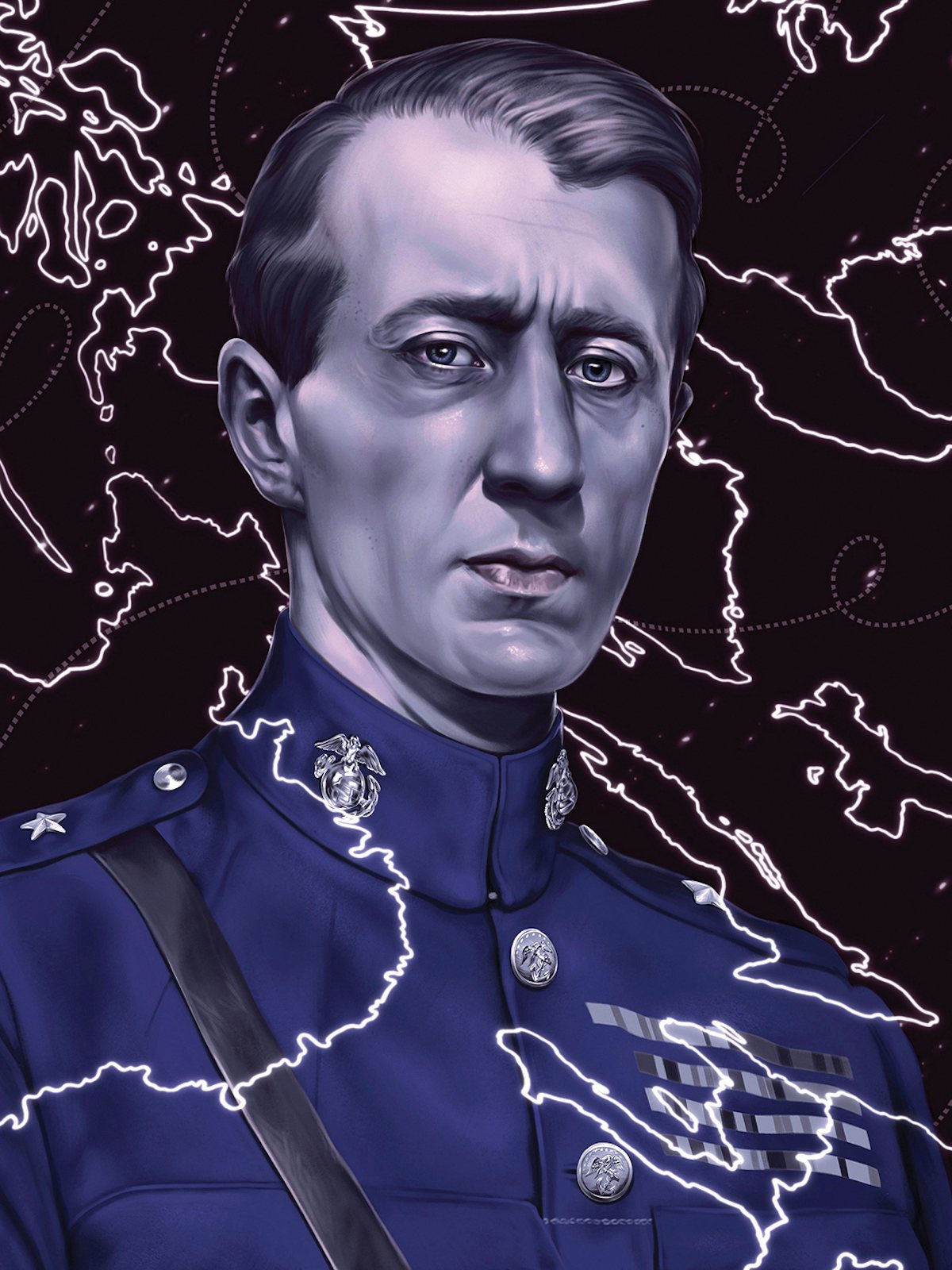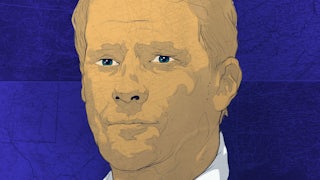There are some figures whose place in the story of the American past is so central that schoolchildren cannot help but know them: George Washington, or Abraham Lincoln, or Rosa Parks. But there is also a group of people who have not passed into national legend, and perhaps whose lives are not considered fit to explain to children. They are most likely to be encountered, if they are encountered at all, in the institutions that often engage the attention of young people between the ages of 18 and 22. Among those, there is probably only a single person who will be discovered almost exclusively by two generally nonoverlapping groups: avid readers of the corpus of Noam Chomsky, and members of the Marine Corps. That man, standing lonely astride the lens-shaped center of a peculiar Venn diagram, has the unlikely name of Smedley Darlington Butler.

The name reflects Butler’s Pennsylvania Quaker heritage—his father, Thomas Butler, was a congressman in the seat once held by his wife’s father, Smedley Darlington. Both were prominent families, but the young Butler would not pursue a career in politics. He was 16 years old when the Spanish-American War broke out. The United States promised it was entering the fight to free the remaining Spanish overseas colonies from tyranny. In spite of the Quaker tradition of pacifism, Butler believed in the mission. “I clenched my fists when I thought of those poor Cuban devils being starved and murdered by the beastly Spanish tyrants,” he wrote later. When he read of the explosion of the USS Maine in the Havana harbor in 1898—which the “yellow journalism” of the era painted as a Spanish attack—he decided to enlist in the Marines. His military career would take him from Cuba to China to Central America, where he became a legend in the Marine Corps, representing martial valor and virtue. Famous in his day, the subject of fiction and film, he retired with two Medals of Honor and a greater number of nicknames—Old Gimlet Eye, the Leatherneck’s Friend, the Fighting Quaker—that testified to his place in the culture.
In the countries he helped occupy, a different memory of Smedley Butler lingers. In Haiti, he was simply known as “The Devil.” In Nicaragua, mothers used to quiet their children with the claim: “Hush! Major Butler will get you.” Butler’s time in the Marines coincided with its transformation from a Navy auxiliary to having its own identity and purpose as a colonial infantry. This might be enough to explain why Butler would make an appearance in the anti-imperialist writings of Noam Chomsky. But it isn’t the reason. In retirement in the 1930s, Butler had a second successful career as a public speaker. He told stories of his military service. And he did so from a remarkably critical—even confessional—point of view.
Writing in the socialist magazine Common Sense in 1935, he put it this way:
I spent 33 years and 4 months in active service as a member of our country’s most agile military force—the Marine Corps.… And during that period I spent most of my time being a high-class muscle man for Big Business, for Wall Street and for the bankers. In short, I was a racketeer for capitalism.
These are the quotations that will send the Chomsky enthusiast scurrying into the stacks of the university library. Meanwhile, at the Library of the Marine Corps at Quantico, Butler’s anti-war writings are isolated from his memoirs and other texts about him—in a separate bookshelf for radical thought that includes the works of Marx.
If you missed your youthful window for Butleriana—either by not being a member of the Marine Corps or by not devoting a shelf in your dorm room to the collected works of Chomsky—Jonathan M. Katz’s engaging new book is an opportunity to correct for the omission. In Gangsters of Capitalism, Katz follows Butler through the archives and on foot, retracing Butler’s path across the globe: from Cuba to the Philippines, to Nicaragua, to Haiti. Sometimes Katz’s visits to Butler’s grounds reveal the ways in which empire has hardly relaxed its grasp. Sometimes they reveal how dramatically the world has changed. Together, they show the force of Butler’s critique, and some of its limitations.
When Butler landed in Cuba, he arrived at Guantánamo Bay. The U.S. Army’s short campaign of ground combat was already essentially over, and Spain was forced to relinquish its claims to Cuba. For propaganda purposes, the United States attributed victory to its own troops, and ignored the much longer struggle of Cubans for their own independence. The U.S. intervention was soon directed at curtailing the social changes for which Cubans had been fighting along with their independence. President McKinley, who had tried to purchase Cuba from Spain in 1897, interpreted “stability” in Cuba to mean that property relations would stay largely intact. The country’s poet-martyr José Martí, who was killed in combat in 1895, had foreseen such impositions, asking, “Once the United States is in Cuba, who will drive it out?”
Nevertheless, the authorization for war from Congress prohibited the United States from acquiring the territory outright (as the country would do to Puerto Rico and the Virgin Islands). Instead, the United States essentially made Cuba a protectorate, insisting on the inclusion of the “Platt Amendment” in Cuba’s constitution. That amendment granted the United States the right to intervene for the purpose of “the maintenance of a government adequate for the protection of life, property, and individual liberty.” And it further required the lease of land that could serve as a coaling or naval station: Guantánamo Bay. It was precisely this legally ambiguous quality of being controlled by the United States but not being part of it that, 100 years later, made Guantánamo attractive as the war on terrorism’s most notorious prison and black site.
Butler’s next destination was the Philippines. Like the Cubans, Filipinos had been fighting for independence from Spain and for social change. But unlike the case of Cuba, no U.S. law prohibited the islands from direct territorial incorporation. McKinley reasoned that Filipinos were unfit for self-government, and the islands might easily be lost to another power. In his mind, the United States had no choice but to take the islands and “uplift” their residents. But the U.S. military ended up in protracted guerrilla warfare. Caught in a frightening quagmire, U.S. troops employed abuses that would reoccur in essentially every conflict with similar dynamics in the years since. Fearful and failing to tell the difference between insurgents (who were also, in this case, independence fighters) and civilians, U.S. forces attacked villages, creating new enemies. And they employed torture—like the “water cure” learned from the Spanish, which involved forcing open the mouth and pouring pails of water down the throats of supine victims until they would “swell up like toads.”
Part of the enthusiasm for holding Philippine territory came from the belief that it would open up access to the great Chinese market, and China proved Butler’s next destination. There, the United States was intervening in the Boxer Rebellion as part of an eight-nation alliance to put down the anti-foreign movement. Butler was shot twice—once in the thigh and once in a button that saved his lungs. Promoted to captain, he was still only 19 when he represented the First Marines as they marched into the Forbidden City. Troops looted and killed Chinese residents of Beijing indiscriminately. “I suppose we shouldn’t have taken anything, but war is hell anyhow and none of us was in the frame of mind to make it any better,” Butler later wrote.
This era’s imperialism was fueled by a sense of civilizational and racial superiority. On the gentler end of the spectrum, this justified patronizing control, and at the brutal end, it justified killing and dehumanization. But the costs of occupation generated discontent: Reports of U.S. conduct in the Philippines and in China horrified some in the United States. Mark Twain, for one, soured on U.S. empire and wrote in 1901 of the satirical “Blessings-of-Civilization Trust” that the United States offered. He imagined the colonial subject, described as the “Person Sitting in Darkness,” as thinking: “There must be two Americas: one that sets the captive free, and one that takes a once-captive’s new freedom away from him, and picks a quarrel with him with nothing to found it on; then kills him to get his land.” Or, as one African American soldier wrote simply of the Philippine War: “All this never would have occurred if the army of occupation would have treated [the Filipinos] as people.”
America’s particular version of “uplift” was largely commercial. Marines found themselves building infrastructure and undertaking public health initiatives that would allow the smooth functioning of international commerce. But “commerce” was frequently represented by concrete business interests. In the next decades, Butler would find himself in Panama, which the United States helped break away from Colombia so that it could build a canal there. He intervened in civil conflicts in Nicaragua and Haiti, leading to long U.S. occupations of both countries. The era’s “dollar diplomacy”—a policy of trying to pull private U.S. banks into the management of the finances of poorer countries—was supposed to replace Philippine-style wars of occupation by “substituting dollars for bullets.” But it required plenty of bullets, too, since it was often Marines who ended up defending U.S. property and investments. The United States seized customhouses without increasing revenue, and directed repayment to U.S. banks, starving governments of funds for development.
Butler frequently found himself dealing with financial and corporate interests that were lobbying the U.S. government for action. He resented it. Butler’s letters home in the 1910s contain the beginnings of the anti-imperialist sentiments he would famously express in the 1930s. In Nicaragua, where Marine intervention helped put in place a conservative government that would accept U.S. financial management, he wrote, “What makes me mad is that the whole revolution is inspired and financed by Americans who have wild cat investments down here and want to make them good by putting in a Government which will declare a monopoly in their favor.” Sometimes, these sentiments were seasoned with overt racism toward the people of the countries to which he was sent. “It is terrible that we should be losing so many men fighting the battles of these d---d spigs—all because [the Wall Street bank] Brown Bros. have some money down here.” In Haiti, Butler himself was responsible for institution of corvée labor for roadbuilding, which was an unpaid labor draft that was enforced with violence, including killing those who tried to escape. “Is that not slavery?” asked one survivor.
Gangsters of Capitalism is not only a biography of Butler. The long-dead Marine also serves as Katz’s Virgil, leading him on a journey around the world and through the inferno of empire’s afterlife. Katz himself learned about Butler as a reporter for the Associated Press in Haiti. Based in the Haitian capital of Port-au-Prince during the earthquake in 2010, Katz reported on the disaster, which killed at least 100,000 people; he escaped from the house that served as the AP bureau not long before it collapsed. Haiti’s poverty—the starkest in the hemisphere—unquestionably compounded the natural disaster of the earthquake into a human tragedy. (Chile had a higher magnitude quake the same year, and the deaths numbered in the hundreds.)
And Haiti’s poverty is inextricable from its punishing treatment by the rest of the world, including the United States. In the eighteenth century, it had been France’s wealthiest colony, with an economy that depended on slave labor to produce sugar, coffee, and other tropical commodities. Its revolution of 1791 to 1804, which took the form of a slave revolt, made it the first Black republic in the world. Its abolition of slavery terrified slave owners throughout the Americas. The newly independent country faced decades of imperial retaliation. Through gunboat diplomacy, France forced Haiti to agree to an enormous indemnity in exchange for recognition. Years later, the United States also intervened, on the grounds that it aimed to prevent European powers from occupying countries in the Western Hemisphere to collect debts. More than half of Haiti’s gold reserves were whisked away to New York in 1914, and occupation followed from 1915 to 1934. Haiti’s final indemnity payment was made in 1947, not to France but to National City Bank of New York—today’s Citibank.
Like most imperial powers, the United States described its occupation as altruistic. But its idea of altruism placed U.S. business interests and political “stability” first. Those who rose in rebellion were brutally suppressed. The United States insisted on changes to the constitution to allow foreign ownership of land, which required the dissolution of Haiti’s legislature at gunpoint. U.S. occupying forces worked with local elites to impose their vision of social order, locking in existing inequalities and dismantling mechanisms through which they might be addressed. Long after U.S. troops have left, these legacies remain.
As Katz follows Butler around the world, he finds that memories of U.S. interventions are complex. In Panama, graffiti calling for the expulsion of the United States from Latin America is painted by street gangs that use the names “Iraq” or “Pentagon.” The mayor of Balangiga in the Philippines, the site of a deadly attack on U.S. troops that led to widespread and brutal reprisals, tells Katz about his own brother’s service in the U.S. Marines. When Katz tries to sum up the mayor’s views as “You have to remember and forget at the same time,” the mayor instantly agrees.
Some of Katz’s visits produce more compelling evidence of ongoing legacies than others. Butler was part of an occupation of the Mexican city of Veracruz in 1914, which U.S. oil companies had encouraged to protect their investments during the Mexican Revolution. But to connect that occupation to the current Mexican president’s nationalist energy policy requires a lot of dots. In other places, the dynamics of repression have been inverted. In Nicaragua, the government of Daniel Ortega uses the history of U.S. imperialism to justify authoritarian rule. And in China, a group of scholars speaking to Katz are not eager to answer his questions about whether China—whose behavior toward nearby islands and its financial pressure on allied governments would be recognizable to Butler—could act as an imperial power, too.
Butler’s formal retirement from the Marine Corps came in 1931. He had spent some years in the 1920s as Philadelphia’s director of public safety, when he took a hard line against vice while trying to disrupt protection rackets operated by corrupt police officers. He saw it all as part of a broader fight against “gangsterism.” By the late 1920s, his children were in college, and he needed supplementary income. He soon realized that there was an audience for his stories. Sometimes they got him in trouble: He was placed under house arrest after he told a story about Mussolini running over a child. But his private observations soon became part of the public conversation in a country experiencing the Great Depression and watching the development of fascism and militarism in Europe.
In the United States, Butler stood against their spread. In 1934, he testified before Congress that he had been approached by Wall Street bankers to organize a fascist coup against Franklin Roosevelt. Whether this “Business Plot” had advanced to the point of being a serious threat remains unresolved, but Butler had certainly witnessed businesses changing a government they found disagreeable many times in his career. “My interest,” he said, “is maintaining a democracy.” In 1935, some of his more popular speeches were compiled into a pamphlet called War Is a Racket, which characterizes military conflict as something “conducted for the benefit of the very few, at the expense of the very many.” It was, as Katz puts it, “a jeremiad for a mass audience” that he hoped would stop the next war.
Butler died in 1940, and faded from public prominence. But Katz makes the case that the life of Smedley Butler is one that we should remember. As if to reinforce the point, while Gangsters of Capitalism was in press, the U.S. military withdrew from Afghanistan, ending a 20-year war that brought more prosperity to Northern Virginia than it did to Afghanistan itself. In September, the Border Patrol pushed back a group of Haitians seeking refuge at the U.S. border. At the same time, the Biden administration sought to find a private contractor to hire Creole-speaking guards to operate a migrant detention facility at Guantánamo Bay, probably for Haitians apprehended at sea. All of this makes Butler as relevant as if he were writing yesterday.
Part of the challenge of assessing Butler’s legacy is that he has been remembered in very different ways by different people. A young Marine might learn of the Butler who held out as a courageous serviceman and who was an early theorist of counterinsurgency. This Marine-in-training would like to be assured that if they are called to risk their life, they will be doing so for national defense, and that they will be able to be proud of what they have done. They might be inclined to dismiss the anti-war Butler as a bitter crank.
At the same time, they should know that many veterans are drawn to the hidden texts of Butler as they try to understand their experiences of deployment. They might recognize in Butler a warning about the inherent limitations of placing tasks of state violence in the hands of frightened young people, however brave they may be. That, even with the best of intentions, the primary concern of U.S. government will never be the welfare of people occupied—it will always be that of Americans, and this will produce resentment. They might recognize that U.S. presence shifts the internal balance of power in societies, often toward authoritarianism. Americans so often take for granted their own good intentions, that they struggle to understand resistance to their attempts to control and change the world.
Butler’s explanation for this, of course, is that business interests are pulling the strings, manipulating foreign policy to their advantage. These are the “racketeer for capitalism” lines often quoted by the anti-imperialist Chomsky, who so admires Butler the dissident that he once placed a bumper sticker of Butler’s words on his office door. According to this way of thinking, the U.S. military provides the shock troops of global capital, in a conspiracy to ensure the profitability of U.S. corporations. Try to find the lie, if you like, in Butler’s statement, “I helped make Mexico, and especially Tampico, safe for American oil interests in 1914. I helped make Haiti and Cuba a decent place for the National City Bank boys to collect revenues in…. I helped purify Nicaragua for the international banking house of Brown Brothers in 1909–1912.” There isn’t one.
But there are limitations to that worldview, too, and Butler, however well-positioned, did not see everything. He was right that the well-being of the U.S. economy, and of U.S. corporations, has an important place in U.S. strategic thinking. But the U.S. government consists of many overlapping departments, and when actions are taken abroad, they aren’t just obeying a single logic. Geopolitics, ideology, and domestic considerations often intersect: Woodrow Wilson, in ordering the occupation of Veracruz, was lobbied by U.S. oil companies; he also acted to stop the arrival of a shipment of German arms to Victoriano Huerta, the ruler who represented the restoration of dictatorship in Mexico. In events outside of Butler’s time, there is the example of the United Fruit Company prodding the CIA to overthrow the government of Guatemala in 1954 when it faced nationalization of its land. But for what it is worth, the former head of Guatemala’s Communist Party thought “they would have overthrown us even if we had grown no bananas.” As the United States deepened its war in Vietnam, there were no U.S. businesses of significance.
Butler’s model does produce insights. U.S. businesses do push for U.S. foreign policy to meet their needs, and the fate of U.S. property is given disproportionate deference. But reducing U.S. foreign policy to a “Business Plot” can produce a kind of cheap anti-imperialism, in which bad behavior is simply the result of hidden lobbies or interests. Its simplicity sometimes crowds out the more complex situations that also arise. A history of the occupation of Nicaragua from 1912 to 1933, written by the scholar Michel Gobat, revealed that it benefited small farmers and frustrated elites. It showed how seriously the United States took the task, by the late 1920s, of overseeing fair voting in the countryside. It trained an elite military force, which it intended to oversee elections and fight the leftist rebellion of Augusto Sandino. And yet, after the U.S. military left Nicaragua, the head of the elite force it had trained seized power in the country. His family held it for most of the next four decades in a brutal dictatorship. It wasn’t the intended outcome; it was, as Gobat puts it, one of the “illiberal effects of liberal imperialism.” This is a deeper and more challenging critique than Butler offers. The problem is not just that U.S. foreign policy is greedy and that its intentions are bad; it is that even when its intentions are good, the nature of its presence can produce disasters, too.
But if there are moments that require more sophistication, it is remarkable how far a little bit of vulgar Butlerism will take you. Butler was paid for rousing speeches, after all, not for a dissertation. In one of his journeys on the Butler trail, in Haiti, Katz is speaking to construction workers near an industrial park, which is in turn near to the grave of a man assassinated by Marines in 1919. When Katz explains his book project and that most Americans have no idea that their country ever occupied Haiti, most of the workers laugh. One is incredulous. “I don’t believe Americans don’t know about that!” he shouts. “How is that possible?” Sometimes the world is a vulgar place, where others pay the price for American ignorance.






